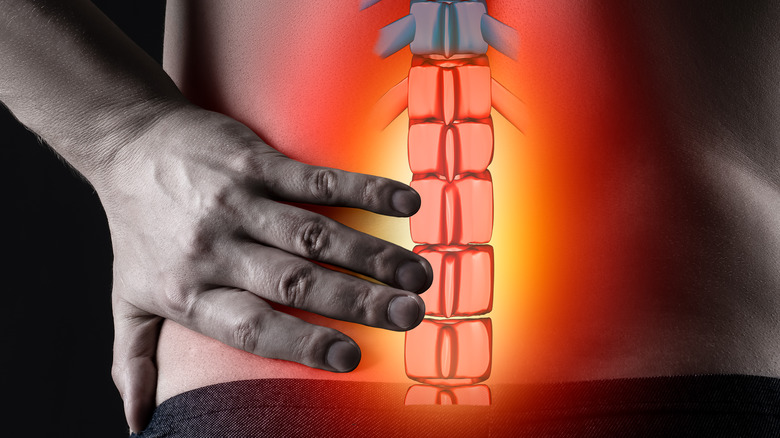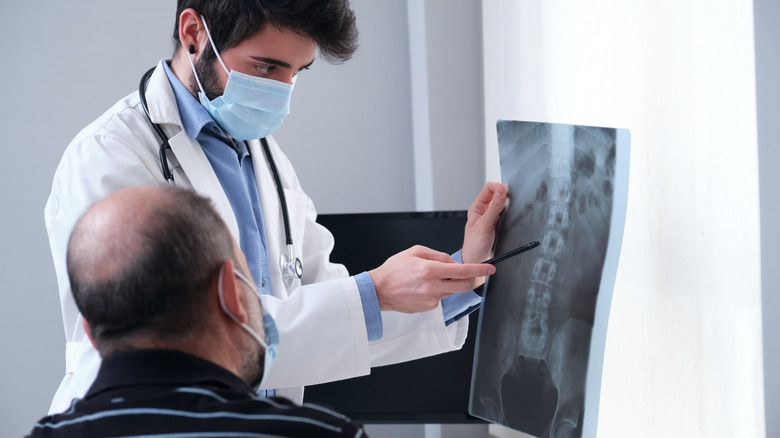If You Get Sharp Pain In Your Lower Back, It Could Be This
Lower back pain is pretty common, estimated to be affecting well over 500 million people worldwide, according to a 2020 study in the Annals of Translational Medicine. Lower back pain affects people of all incomes, ages, and countries, and it's the leading cause of disability (per The Lancet). Back pain can arise from lifting something too heavy, a recent accident, a disease or condition, or wear and tear associated with age (via The Healthy). You're at a higher risk for back pain if you're overweight, a smoker, or don't exercise often.
Some back pain can feel like a dull ache, and others might feel rather sharp. According to Spine-Health, sharp back pain might also include a reduced range of motion, radiating pain to your lower extremities, or weakness or numbness in the legs. Although some of these conditions might go away after a few days or weeks, some might be more severe if left untreated.
The most common cause of lower back pain
According to Houston Methodist Hospital, the most common cause of sharp lower back pain is a strain or a sprain in the back. This might result from a fall, lifting something heavy, or your choice of sport. Repetitive movements and poor posture can strain your lower back gradually over time. A strained muscle in your lower back can cause sharp pain, especially when you move, according to Spine-Health. You might find it hard to stand or walk around, and it might be particularly painful when you transition between sitting and standing. Elevating your legs while lying down might relieve these pulled muscles in your back.
Houston Methodist Hospital suggests taking anti-inflammatories to help with the pain. Cold therapy will also reduce inflammation, and heat will help with the healing. If the pain doesn't resolve after a few days, you might consider other possible causes of your back pain.
Other causes of sharp lower back pain
A herniated disc might feel like a burning sensation in your butt, thigh, or calf if the disc presses on a nerve along your spine, according to Spine-Health. You might also feel stiffness in your lower back, or it might be especially painful to lift heavy objects or exercise. You could feel some relief by taking anti-inflammatories or doing exercises that help extend the spine.
Piriformis syndrome has sharp pain similar to a herniated disc. The piriformis muscle lies deep underneath the gluteus maximus, and the pain might radiate from there or be referred to your lower back. Pain in this area might get worse after sitting for a long time, and you could also feel a warm or burning feeling in the back of your thigh. Pain relievers, stretching, and physical therapy can ease the symptoms of piriformis syndrome.
Lower back pain can also result from an infection, especially if it's accompanied by a fever, notes The Healthy. Arthritis, kidney stones, endometriosis, and fibromyalgia can cause pain in the lower back.
When to see a doctor for your back pain
Although many of the causes of sharp pain in the lower back can be minor, it's important to know when the pain is serious enough to see a doctor. According to the University of Texas Southwestern Medical Center, if the pain from a fall or twist goes away after 72 hours, there's little cause for concern. However, if you notice that the sharp pain continues, increases gradually, or appears suddenly, it could be a sign of something more serious.
Some of the causes of lower back pain might be associated with pain radiating from the glutes to the legs. This might be a sign of spinal compression. If you notice weakness in one or both of your legs, that could be a sign of spinal stenosis or sciatica. Additionally, lower back pain may be accompanied by incontinence, which could indicate a spinal infection or significant nerve compression. Numbness in the groin region may potentially be a sign of a spine or nerve problem. Cauda equina syndrome, the most severe form of spinal nerve injury, can manifest as leg weakness, incontinence, and groin numbness. Consult your doctor right away if you experience back pain and these symptoms.




